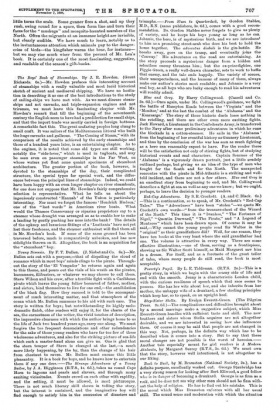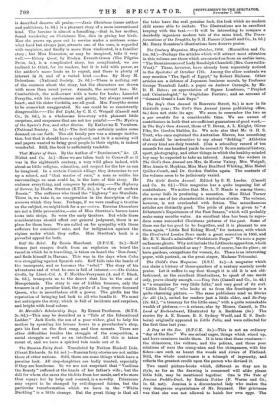Back to Back, by M. Bramston (National Society, 2s.), has
a definite purpose, excellently worked out. George Stanbridge has a very strong reason for looking after Bert Ellwood, a good fellow who is in danger of becoming a drunkard. George is as firm as a rock, and ho does not see why other men should not be firm with- out the help of religion. He has to find out his mistake. This is the moral which Miss Bramston enforces with all her usual skill. The sound sense and moderation with which the situation is described deserve all praise. Janie Christmas (same author and publishers, ls. 6d.) is a pleasant story of a more conventional kind. The heroine is almost a foundling,—that is, her mother, found wandering on Christmas Eve, dies in giving her birth. How she grows up, goes out to service under a mistress some- what hard but always just, attracts one of the sons, is regarded with suspicion, and finally is more than vindicated, is a familiar story ; but Miss Bramston; as may be imagined, tells it very well.—Ifilary Quest, by Evelyn Everett-Green (The Pilgrim Press, 5s.), is a complicated story, too complicated, we are inclined to think, for its readers, but it is told with power, as the author's name leads us to expect, and there is plenty of interest in it, and of a varied kind. —Rue. By Mary M. Debenham. (National Society. 2s. 6d.)—There is nothing out of the common about the story, but the characters are drawn with more than usual power. Amanda, the servant lass ; Mr. Cumberbirch, the mill-owner with a 'taste for books ; Lancelot Forsythe, with his carelessness and gaiety, but always sound at heart; and his sister Cordelia, are all good. Mrs. Forsythe seems to be somewhat exaggerated. No one could be so consistently disagreeable.—The Red Light, by C. E. C. Weigel' (Cassell and Co., 2s. 6d.), is a wholesome love-story with pleasant little surprises, and suspenses that are not too painful.—The Mystery of the Squire's Pew, and other Stories. By Katherine E. Vernham. (National Society. ls. 6d.)—The first tale certainly makes some demand on our faith. The old family pew was a strange institu- tion, but that it should have a cupboard, and in it a missing will and papers wanted to bring good people to their rights, is indeed wonderful. Still, the book is sufficiently readable.





























































 Previous page
Previous page